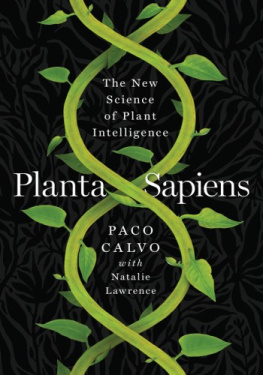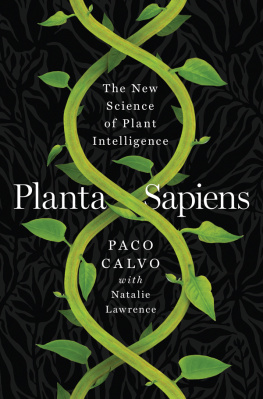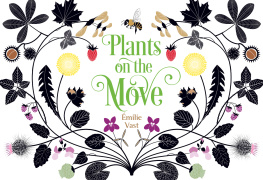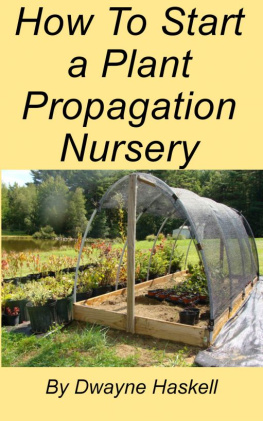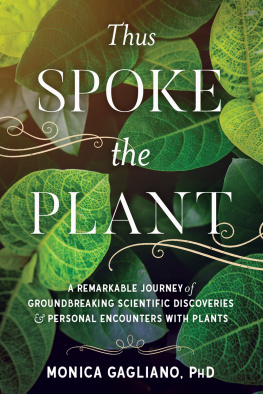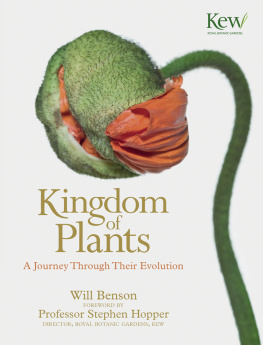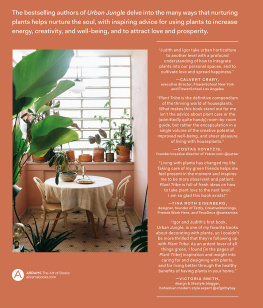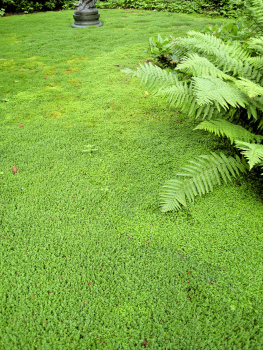PLANTA SAPIENS
THE NEW SCIENCE OF
PLANT INTELLIGENCE
Paco Calvo
with Natalie Lawrence
For Anabel
Verde que te quiero verde Federico Garca Lorca
CONTENTS
But one never knows where to find them. The wind blows them away.
They have no roots, and that makes their life very difficult.
Antoine de Saint-Exupry, The Little Prince
I have spent many years seeking to understand the experiences of organisms that are very different from us: to uncover the nature of plant intelligence. Its no small feat. The scientific work is far from done, but what we have found out so far just about shows us how much more there is to discover. This book is the culmination of two decades of passionate exploration into a rich and alternate world that exists alongside our own.
My venture began in 2006 when I read a book about the neuronal aspects of plant life edited by three scientists, Frantiek Baluka, Stefano Mancuso and Dieter Volkmann. This might sound strange: plants do not have neurones, after all. I had never considered plants in this way myself. But after I attended a conference of the Society of Plant Neurobiology in the High Tatras of Slovakia the following year, I became nothing short of obsessed with the idea. It was the beginning of a long journey which took me around the world, from the botanical gardens of London, Edinburgh and New York, to India, China, Brazil, Chile and Australia, even the jungles of Mauritius. But the physical distance I have traversed has hardly compared to the mental ground I have covered.
One thing I have come to realise through this work is just how irresistible humans find it to draw big conclusions about the world from individual experience. Its part of what makes us the sapient creatures that we are. And what makes us incredibly blinkered.
Even the finest thinkers in human history have been prone to navel-gazing. The ancient Greek philosophers, whose work widely fertilised our intellectual history, saw a world that mirrored their perspective in quite a literal sense. For the Greeks, the centre of Hellenic powerDelphiwas also the centre of the geographical world. They called it the Omphalos , the worlds navel. It was said to have been the meeting point of two identical eagles that had been released by Zeus from either end of the world. The Delphic Oracle who took residence there was revered across the ancient world. Pilgrims would walk for days to reach the sanctuary in the foothills of Mount Parnassos, because to consult the Delphic Oracle was to tug directly on the cosmological umbilical cord.
I found myself travelling to Delphi in 2019 to join a gathering of diverse minds, including philosophers, scientists and creatives. We were meeting to discuss humanitys place in the world. Whether through earnestness or irony, we met at the navel of the classical world to consider humanitys habit of navel-gazingand to work out how to move beyond it. The ancient Greeks were not the only civilisation to fall into Omphalos syndrome, the belief that ones own socio-political centre is the centre of the cosmos. Its been a habit throughout history: as individuals and societies, we all have a tendency to think the world revolves around us. And it has landed us in a great deal of troubleecologically, politically and psychologically. Now, this intrepid band of thinkers had met at Delphi to untangle the nature of humanity and our interactions with the environment. To seek out new ways of thinking for a different kind of futureone that might give us a more mature and connected kind of congress with other living things.
During the weekend, we had the opportunity to explore the archaeological site. As I stood on the forecourt ruins of the Temple of Apollo, surrounded by the brown scree slopes of the mountain, I thought of the two words fabled to have been inscribed there: Know Thyself. A simple injunction, but a lifetimes work for the individual. Certainly more than a conferences worth even for a hundred intellectuals. I had a strong inkling that we needed to think very differently to get deeper into these problems, to learn from other species and come at investigating our own minds in a new way. But I did not realise the full extent of how radical my focus would become.
Delphi was a kind of conversion experience for me. The landscape itself mirrored the problem we were trying to solve: it was filled with history interlaced with the living present, archaeological sites couched in resinous forests and meadows. But we tend to see only the rubble remains and faint imprints of the past. We are only dimly aware of the commerce of organisms for which these human productions are now a stage. It was there that I realised clearly that to know thyself, one had to think well beyond oneself, or even ones species. One can only know thyself by knowing others. We have to think into the experiences of other organisms dramatically different from ourselves, however rudimentary or complex they might be. So different in fact that their experiences might be generated without any of the familiar animal thinking machinery. No brains, neurones or synapses. I began to think about the sapience of plants.
We are so entrenched in the dogma of neuronal intelligence, brain-centric consciousness, that we find it difficult to imagine alternative kinds of internal experience. The title of this book alone might evoke derision and consternation from some. This is understandable: it challenges the foundations of human experience. To begin building a picture of how thinking without brains might be possible, this book will skirt the frontiers of neuroscience, plant physiology, psychology and philosophy, to delve into what it might be like to be a plant. I will take the seeds of scientific evidence and cautiously see where they might grow with further investigation.
Caution is necessary: whether you are deeply sceptical of the possibility that plants might have intelligence or are an enthusiastic believer in the supernatural wisdom of other lifeforms, we all need to broaden our minds carefully. To dramatically shift our understanding of the world in a measured way, based on the evidence as it emerges. I neither want to narrow-mindedly ignore the astounding possibilities of what science is uncovering nor to start a new animistic cult of nature worship. This book is written for everyone, both those who believe that plants might be intelligent and those who believe they could not possibly be. What you read here will be a challenge to anyones preconceptions. So try to let them go, begin with an open mind, and follow the path that the evidence is building for usif we can allow ourselves to see it.
What we might find may scare us: understanding other ways to be in the world will probably show us that human intelligence is not quite as special as we like to think. We are just about beginning to acknowledge that non-human animals might have intelligence, but accepting that plants might requires a radical shift. Losing our assumed place at the top of some imagined hierarchy might seem galling but the rewards of shifting our perceptions will be wondrous. The question is, to borrow from the Dutch primatologist Frans de Waalare we smart enough to know how smart plants are? I might also addare we brave enough?
The work begins in our own minds. One of the most powerful tools that Charles Darwin used as he developed his theory of evolution by natural selection was not a scientific instrument or a specimen. It was the motion of his own body through space. Every day, once in the morning and once in the afternoon, he would walk along the Sand Walk, a gravel path bordering the grounds of his house at Downe in Kent. He called this route his thinking path. In the rain, sun or sleet, Darwin mused over his readings, correspondence and experiments in the passing company of plants and animals. He was one of many thinkers to use the power of physical motion to move the mind forward and help thoughts to grow.
Next page
